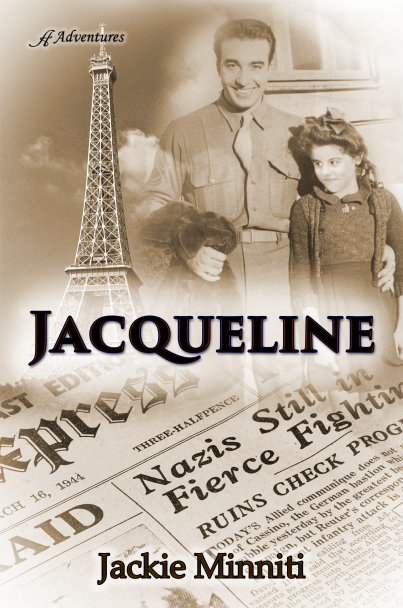A GUEST POST BY JACKIE MINNITI
One thing I learned from my years of teaching reading in middle school was that middle graders have very definite opinions about books. We had some very lively discussions about what they liked (and hated) in the books they read. This came in handy when I decided to write Jacqueline, my middle grade historical novel. I wanted Jacqueline to appeal to even the most reluctant readers, so I decided to make a list of what to avoid when writing for 8 to 12 year-olds.
- DON’T make your book too “fat.”
One thing that was like Kryptonite to my middle grade students was a book that looked too thick. Most of them wouldn’t even pick up a “fat” book, so keep your word count between 30,000 and 60,000 words. This will force you to keep your writing on a diet. Edit relentlessly.
- DON’T use graphic scenes or coarse language
Remember that your book will need to get past the gatekeepers (parents and teachers) who actually do the buying. Avoid graphic violence, cursing, or any hint of sexual activity. Your book should be something a teacher could read to a class without sending parents running to the school board.
- DON’T make your protagonist perfect
Your main character will make or break your story. Middle graders like to read about characters who are a little older, so make your protagonist between 10 and 13 years old. Your main character should have strong opinions and beliefs and be someone young readers can care about and identify with. This will be difficult for them to do if your the character is too perfect, so be sure to include some flaws.
- DON’T overdo the introspection
Middle graders don’t do a lot of navel-gazing, so your main character shouldn’t spend a lot of time on self-examination. Keep focused on the action, and reveal your character’s thoughts and feelings through what he or she says and does.
- DON’T talk down or preach
Few things irritate middle school kids as much a someone talking down to them, so don’t write down to them either. Use challenging language, but include context clues to help young readers figure out unfamiliar words. Your theme should be presented in a subtle, non-“preachy” way. And don’t be afraid to tackle difficult subjects. Jacqueline deals with death, war, and the Holocaust – pretty heavy subjects, but handled in an age-appropriate manner.
- DON’T use “helicopter adults”
In middle school, kids are shifting their focus from home and family to school and friends. Keep the adult characters in your story in the background. Center most of the action on your main character’s interaction with the outside world. And be sure the central conflict in the story is one your protagonist can resolve without adult intervention.
- DON’T overdo description
While your story should definitely include description and sensory details, keep it to about 10% of the total text. While you may love the sound of lush, descriptive writing, your middle school readers will quickly become bored with anything that gets in the way of the action. Keep this in mind when you have to cut a favorite paragraph.
- DON’T forget humor
Middle graders love “funny stuff,” and that goes for the books they enjoy. Be sure to include humor in your story – the more, the better. Jacqueline is definitely not a humorous story, but I tried to include enough amusing incidents to provide some comic relief.
- Don’t slow down
Middle school kids have no qualms about abandoning a book that becomes “boring,” so keep that plot moving forward. Don’t overuse adjectives or adverbs, and stick to the “Show, don’t tell” rule to keep the momentum going. Try to end each chapter with a cliff-hanger to keep them flipping pages. Remember that your book is competing with television, iPads and Wiis, so it had better be interesting.
- Don’t leave them hanging
One of the biggest complaints from my students when they didn’t like a book was that the ending wasn’t satisfying. They hate open endings. I’ve actually seen kids throw a book across the room because the ending wasn’t definitive. That’s one of the reasons I decided to end Jacqueline with an epilogue that told what happened to the characters as grown-ups. Try to end on a positive note, and be sure to tie up any loose ends.
While writing for middle grade readers presents some unique challenges, your book can have a profound influence on them. That’s what makes the process worthwhile – and so much fun!
Read Jackie Minniti’s Middle Grade novel, Jacquleine.
When ten-year-old Jacqueline Falna hears her mother’s scream, she is unaware that the axis of her world is about to tilt. Her father’s plane has been shot down by German fighters. In the midst of poverty, food shortages, air raids, and the grinding hardship of daily life under Nazi rule, she forms an unlikely alliance with David Bergier, a twelve-year-old Jewish neighbor who poses as her cousin after his family is “relocated” by the Nazis. When Rennes is liberated, Jacqueline meets an American soldier and becomes convinced that he has been sent to reunite her with her father.
Based on a true story, “Jacqueline” is a tale of family, faith, unusual friendships, and the resiliency of the human spirit set against the backdrop of occupied Rennes in 1944. With the drama of fiction and the authenticity of personal history, “Jacqueline” is both a story about family and a family’s story.



Good advice from the author of a wonderful book!
I agree 100%. Great list!
Reblogged this on adaratrosclair and commented:
I had the pleasure of meeting Jacqueline at Get Lit Largo,
a literary event that brings bring readers and writers together. She shares great tips on what NOT to do when writing a middle-grade fiction novel. ENJOY! 🙂